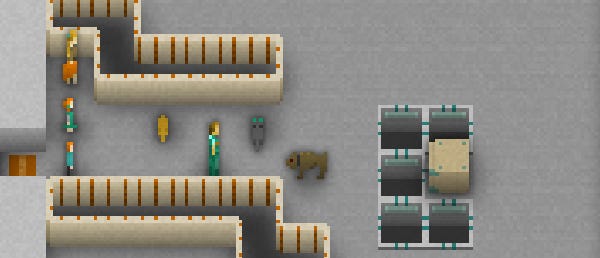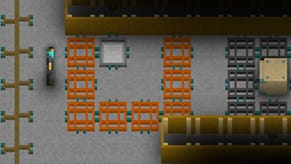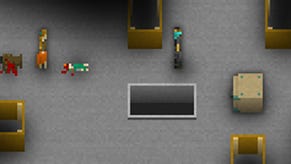Impressions, Part 1: Jason Rohrer's The Castle Doctrine
An Englishman's home
The Castle Doctrine, the upcoming game from Passage and Sleep Is Death creator Jason Rohrer, is an indie MMO about criminals invading your home, and you invading their homes. A combination of base-building and puzzle-solving, it's also an examination of how it feels to be both victim and villain. I've spent some time with an early version of the game.
I killed a woman for the sake of $21.
I killed a woman.
For $21.
I killed a woman.
Much has, and will, be made of the politics which informs Passage creator Jason's Rohrer's lo-fi, strategic MMO about home invasion. The Sleep Is Death developer has been entirely open about his (unusual among game developers) belief in the right to bear arms and how that inspired the game, but in practice I'm not sure much of that is visible in The Castle Doctrine. It plays to me like a horror game rather than an statement game. Less From My Cold Dead Hands, more life is nasty, brutish and short.
Equally, I'm not sure saying something like "The Castle Doctrine is set in a dystopic reality where everyone is both victim and criminal, locked in a perpetual cycle of robbery and violence" is apt. The game's more a concept, or a structure for game systems, than it is a setting. Devoid of exposition, or indeed any words other than the names and worth of in-game items and characters, it plunges its anonymised players directly into the twin objectives of defend and invade. It is cold, so cold. And yet, wordlessly, I felt the pull to protect the three randomly-named, distinguishing feature-free family members (one wife, two children) I was assigned.
My home, like every other player's home, begins as a large, empty grey box containing only the family and our vault. It's up to me to fill it, with traps, defences, dogs and walls, otherwise it's an open goal. The evident vulnerability was shocking, every time I saw it - were someone to walk in, there'd be nothing stopping them from simply walking right up to and brutalising these three tiny people in this vast empty space. I had to do something about it.
I knew I had to because I knew that everyone else in the game would want to rob me. I knew that because I wanted to rob all of them. I'd love to claim I encountered some moral obstacle here, something which gave me pause for thought, stayed my hand from invading some other, unknown player's house and stealing all they had. I'd love to claim that I silently, sternly proclaimed "no, Rohrer, I will not play the game behind this game, this test of the darkness in the human soul. I will not and do not have to do these awful things." But I did not.
Am I evil?
I don't think so. I think, I hope, that instead I was simply guided by the twin motivations of seeing a number in a videogame and wanting to make it larger, and observing what might be The Castle Doctrine's key weakness in this early, low-player version - that all is transitory here. Player death is so sudden, so instant, so frequent (in my experience, which may well not be entirely accurate - more on that very shortly) and a new 'game' so hot on its heels that I struggled to imagine any of my victims being brought to their knees in horror by the loss of their cash. They'd probably have died soon enough and have lost it all anyway. Right?
Not necessarily, actually. I have to be speculative here, as the early, closed version of the game I've been looking at holds just a handful of players, few of which seem to be playing regularly. Thus, they have only basic home defence setups, with little spent, little stolen and in turn little to lose. At the time of writing, I've robbed everyone else who has cash blind, bar one house which is either bugged or has devised a system so fiendish as to be unbreakable. I haven't been robbed yet, though I've killed myself so many times in the spirit of investigation that I don't have many 'earnings' to lose anyway. In time though, with more players, I fully expect to see intricate, deadly, expert house designs which protect vast wealth built up over long periods. Were their owners to lose these hoards, they very probably would feel violated.
Even in the limited microcosm of this pre-release version, there is one violation all present and correct. That $21 - the cost of a life. For the longest time, I held out against killing any humans. While my attitude towards theft is perhaps worryingly cavalier (in and out of games - I'll always play a rogue in RPGs, and I have an unfortunate habit of drunkenly nicking beer glasses I like the look of from pubs. Why am I admitting this here? Oh well), I've always struggled with killing innocents in videogames. Er, and in real life, of course. Perhaps not in openly transgressive fare like GTA and Syndicate, but you won't catch me doing murdering townsfolk in Skyrim or Ultima, or snapping the necks of Little Sisters. I had to force myself to take a life in The Castle Doctrine, but I did so in the name of dark experimentation and because, well, I'd basically stolen all there was to steal, at least until new players entered the game or dead ones started a new character.
Families, especially the two children every player beings a game with, serve little practical purpose in The Castle Doctrine, but importantly Wives will attempt to flee their house with half its money upon sighting an intruder. This raises the game's key dilemma: let her go, both so that she might live and so the player will be left with some cash to rebuild with, or hunt her down for the bonus money.
Having already repeatedly robbed the same poorly-protected house, each time going home with 50% of what was left, ultimately I elected to Use Crowbar On Mary in order that I might collect all the loot in one fell swoop. It was so quick. Instant. Silent. Barely even animated - just a sprite changing from standing to collapsed, with a few new, red pixels around it. I could have used a gun, but the effect would have been the same - a one-shot-use item, only that would have been ranged rather than close-up killing. I had previously used guns to take out another player's guard dogs before they savaged me, but while I felt guilty about opting for the fatal option rather than neutralising them with drugged meat, it was nothing compared to how I felt after murdering Mary. Again, this isn't really a game about guns. It's a game about violation.
Today, I had been the violator, and I felt terrible. I'm reasonably, reassuringly sure I'd have felt equally terrible were it $2100, not the pitiful $21 I went home with. I don't, however, imagine that all The Castle Doctrine's players will feel similarly, especially once the cold war of having to build ever more intricate, ever-more expensive defences really sets in and there becomes an arguable necessity to lay red right hands on as much cash as possible. And, in the wake of suffering their own homes invaded and their spouses slain, craving vengeance against those who had done it. And so will the children surely die too, for no reason other than revenge. Well, also for the lulz, should the Internet Is Serious Business crowd decide to get involved.
Until if and when that happens, and duly makes fools of us all, I can confidently declare this a powerful, memorable game. Upsetting, yes, but not exploitative. It's a smartly strategic game too, but I'll talk about that tomorrow. Right now I'm focused on the knot I feel in my sickened stomach, the ache of my gritted jaw. This is a captivating horror game, with me as both victim and monster.
$21. I can't get it out of my head. The image of that handful of slumped pixels keeps coming back to me. There's been justified concern that The Castle Doctrine essentially relegates women to the role of walking wallets, with no purpose other than to dutifully, unprotestingly ferry money around, with no powers of decision or defence themselves. Much as the developer has defended the fixed Man-as-earner/defender, Woman as housekeeper/victim setup as as reflection of his artistic and autobiographical vision, I feel it's an ultimately needless decision which will only bring upset to the game's door. The pixel-people are so indistinct and anonymous that genders and gender roles might as well have been entirely randomly assigned, so I'm left even more unsure of why the developer wasn't flexible in that regard. I wouldn't think twice about whether I encountered a Mary or a Mike in that role, whether they wore trousers or a dress.
What's important, in any case, is that one of the adults in the house is known, by the player and their rivals alike, to be vulnerable, and ostensibly innocent. That's where the power is - in knowing that when I killed that person for those $21, they had not done and never would do anything to me. They could not protect themselves. They were at my mercy, and as such I had ultimate power. Power I, in this instance, chose to abuse. For $21.
Some player, whose name I will never know, will login to the game tonight, and discover what I've done. Maybe he or she'll notice that their balance is at zero first, but more than likely their eye will be immediately drawn to that handful of red-tinged pixels. And they'll wonder who, and why. They'll watch the security tapes in which I rob their house again and again, and then, on the final occasion, walk directly to Mary, pause for nowhere near long enough, and...
$21.
In part two tomorrow, I'll talk about how house/trap design and circumvention works in The Castle Doctrine.




















